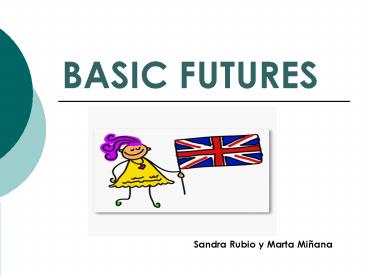BASIC FUTURES - PowerPoint PPT Presentation
Title:
BASIC FUTURES
Description:
BASIC FUTURES Sandra Rubio y Marta Mi ana FUTURE SIMPLE Explanation: Will future expresses a spontaneous decision, an assumption with regard to the future or an ... – PowerPoint PPT presentation
Number of Views:212
Avg rating:3.0/5.0
Title: BASIC FUTURES
1
BASIC FUTURES
- Sandra Rubio y Marta Miñana
2
FUTURE SIMPLE
- Explanation
- Will future expresses a spontaneous
decision, an assumption with regard to the future
or an action in the future that cannot be
influenced. - Form
Affirmative Negative Interrogative
Subjectwillverb (infinitive) complements You will work next year. Subjectwon'tverb (infinitive) complements She won't forget it. Willsubjectverb (infinitive) complements? Will they have a cat?
3
FUTURE SIMPLE
- Use
- A spontaneous decision
- example Wait, I will help you.
- An opinion, hope, uncertainty or assumption
regarding the future - example He will probably come back tomorrow.
- A promise
- example I will not watch TV tonight.
- A prediction
- example It will rain tomorrow.
- A timetable
- example Dr. Brown will see his patients at 5.00
4
FUTURE SIMPLE
- Time expressions
- This evening, later, next month, soon, at
eleven oclock, in an hour, tomorrow, in a few
weeks, on the 8th of May, in the future.
5
BE GOING TO
- Explanation
Going to future expresses a conclusion regarding
the immediate future or an action in the near
future that has already been planned or prepared.
Near Future (be going to)
- Form
Affirmative Negative Interrogative
Subjectverb to be going toverb (infinitive) complements You are going to walk this afternoon. Subjectverb to be (negative)going to verb(infinitive) complements She isn't going to draw a car. Verb to besubject going toverb (infinitive) complements? Are they going to prepare a party?
6
BE GOING TO
- Use
- A planned action for the future
- example The newspaper is going to publish
the results of the experiment next week. - An action that is about to happen
- example Be careful! The dog is going to
bite you.
- Time expressions
- This evening, later, next month, soon, at eleven
oclock, in an hour, tomorrow, in a few weeks, on
the 8th of May
7
PRESENT CONTINUOUS
- Explanation
Sometimes, speakers use the Present Continuous to
indicate that something will or will not happen
in the near future. The difference with
going to is that the Present continuous is used
for personal and planned planes Example
The scientist is receiving/ going to receive a
prize this afternoon
Its necessary to use a time expression referent
at the future, not present.
8
FUTURE PERFECT
- Explanation
expresses an action that will be finished at a
certain time in the future.
- Form
Affirmative Negative Interrogative
Subjectwill have verb(participle) complements You will have finished your work. Subjectwon't have verb(participle) complements She won't have ended it. Willsubjecthave verb(participle) complements? Will they have found this cat?
9
FUTURE PERFECT
- Use
A completed action at a certain future time
example Patients will have finished their
treatment in two months.
- Time expressions
- By this time next week, by ten o'clock, by the
end of, by then, by August, in two months.
10
FUTURE CONTINUOUS
- Explanation
progressive puts emphasis on the course of an
action taking place in the future.
- Form
Affirmative Negative Interrogative
Subjectwillbe verb(-ing) complements You will be working next year. Subjectwon'tbe verb(-ing) complements She won't be getting it. Willsubjectbe verb(-ing) complements? Will they be having dinner?
11
FUTURE CONTINUOUS
- Use
- An action in progress at a certain future
time. - example at this time tomorrow, Jack
and Brian will be training.
An action in progress in the future
- Time expressions
- At this time tomorrow, at this time next..., on
Thursday, in the next decades
12
EXERCISES
- Future simple and future continuous
- Be going to
- Future perfect































